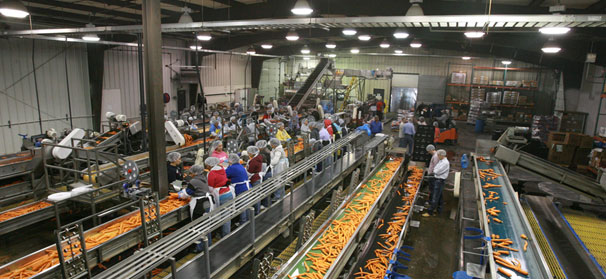
Nov 19, 2012Bolthouse finds ways to save energy, money
Spending money to save money also means saving energy at the Bolthouse Farms processing facility in Prosser, Wash.
Jim Robbins, vice president of technical services for Bolthouse Farms, based in Bakersfield, Calif., said that when the Prosser location was acquired five years ago, the company intended to implement some of the same energy-savings measures that represent business as usual in its California operations. The company’s Prosser facility is devoted entirely to producing washed, fresh-wrapped and cut baby carrots.
“We package under our own label, private label; we do both conventional and we also do organic,” Robbins said. “Almost all of our organic goes to Costco under the Earthbound Farm (brand).”
Meanwhile, the Northwest Energy Efficiency Alliance (NEEA) had formed in the northwestern United States. Supported by and collaborating with more than 100 utilities, the Bonneville Power Administration and the Energy Trust of Oregon, NEEA’s mission is to accelerate the innovation and adoption of energy-efficient products, services and practices.
Partnering with the Northwest Food Processors Association (NWFPA) was NEEA’s way of trying to reach and work with members throughout the region to reduce energy costs – exactly what Bolthouse Farms was looking for.
“What we found was that many companies weren’t tracking their energy use,” said Pam Barrow, NWFPA’s energy director. “That’s an important first step – finding out what your energy intensity baseline is. The key to that is collecting data and monitoring your energy use, and that seems to result in savings in and of itself on the order of 2 to 5 percent – just by paying attention.”
Bolthouse certainly was. Its director of operations in Prosser, Jeff Janosky, began working with local utilities to evaluate how the plant could reduce energy usage, Robbins said. He also registered the facility for an NWFPA energy-use study.
“What we’re finding is that refrigeration is a large part of our electricity usage, so NEEA provides lots of training in refrigeration best practices and we’re getting all of our folks to attend those NEEA courses and do the kinds of operation and maintenance to their facilities in their refrigeration,” Barrow said. “That’s resulted in a significant savings.”
Other key areas that yield savings include replacing old equipment, fixing compressed air leaks and remedying boiler inefficiencies.
For Bolthouse’s Prosser plant, improving lighting came first.
“We’ve converted all of our 120-volt to 277-volt,” Robbins said. “We’re also putting in energy-saver lamps. We’ve actually increased our lumens because it was a pretty dark facility when we went into it.
“That’s kind of a nice plus, but we’ve also saved energy. Our estimate right now is a 35 percent reduction in energy use in just lighting.”
The company also has been updating its distribution panels so that energy can be utilized more evenly.
And taking a page from its California operations, Bolthouse is also looking at implementing interruptible power in Prosser – a procedure that saves “several hundred thousand dollars” annually in California.
“We are targeted for periods where, on notice, we can cut our power here by 75 percent for a four-hour period,” Robbins said, noting that Bolthouse runs production around the clock. “So, we get a notification from the power company, and within that hour we will redistribute our work load for the four-hour period, and we’re able to cut it down 75 percent. It minimizes production, but it doesn’t stop it.”
And by working with NEEA and NWFPA, Robbins said, everybody in the region’s food processing industry benefits.
“You get a large set of processors involved and there’s an incredible amount of sharing of knowledge,” Robbins said. “It does bring together the things that are noncompetitive and helps us all to take advantage of that.”
In fact, NWFPA’s membership has imposed a goal of reducing energy consumption 25 percent over 10 years through its partnership with NEEA.
“They are estimating a 10-year savings of $192 million in doing that, compared to the cost of not doing anything,” Barrow said.
And setting that goal was key, said NEEA Marketing Manager Sharon Peterson.
“The goal serves as a focal point,” Peterson said. “We’re proud to be associated with NWFPA, because groups are not doing this kind of thing in general and they have been a leader in the nation on goal setting.”
Barrow added, “Our partnership with NEEA has allowed us to do this goal work and to make the kind of progress we have made. They have been a very, very important partner to us.”
By Kathy Gibbons, VGN Correspondent
















